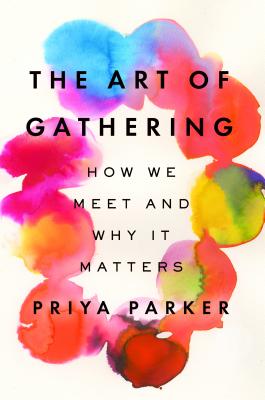Little Green Light is a cloud-based donor management system for fundraisers.
Subscribe to get our latest product updates, best practices and tips to grow your nonprofit.

Making your nonprofit’s special events more meaningful is more important than ever!
 Whether your organization is hosting in-person events again or continues to host virtual events, The Art of Gathering: How We Meet and Why It Matters by Priya Parker is full of insights for you to consider.
Whether your organization is hosting in-person events again or continues to host virtual events, The Art of Gathering: How We Meet and Why It Matters by Priya Parker is full of insights for you to consider.
We spend a lot of time preparing things for an event: Menus, name tags, table assignments, sponsor signage. Parker urges you to focus on “preparing human beings and not crudités.” She asserts that “ninety percent of what makes a gathering successful is put in place beforehand” and that “asking guests to contribute to a gathering ahead of time changes their perception of it.” If an event registration asks guests to submit a question for the workshop prior to the event, or you reach out to gala attendees in advance to share what inspired them to support your organization, you can help put people in the state of mind in which you want them to attend the event.
Parker is clear: If you want to “launch your event well, quit starting with logistics.” She recounts a story of attending the funeral of a close friend. Emotions were high among the mourners, and when the minister got up to speak at the opening of the service, they were eager for words of wisdom and comfort. Instead, the minister opened with an announcement that there would be a reception down the street afterward, but there wasn’t sufficient parking at the venue so he recommended attendees walk. He could have harnessed the emotional energy that filled the space. Instead, he launched with logistics. The poignancy of that initial moment evaporated.
Do people need to know where the bathrooms are, or to use the chat box to submit questions to the webinar moderator? Sure. Should that be your opening of an event, whether in person or virtual? No. Instead, Parker recommends starting with a cold open, like you see on TV when a show starts right off with a scene rather than credits. Your opening should make the attendees feel welcome and grateful to be there, and it should set the tone for the event.
How many times have you been to an event where it ended with a request to turn in your name badges before leaving? A good thing to do, but a bad way to end. A meaningful end is important. A thoughtful closing can guide attendees to think about their experience: “What transpired here? …Why does that matter? …How am I going to talk about it with others?” Your closing should reflect the spirit of your launch. Open with meaning, close with meaning.
Thank yous fall into the category of logistics: You shouldn’t open or close with them. I bristled against this point when I first read it, until I thought of a play I’d attended. The audience buzzed in anticipation, and the excitement grew when the lights went down. Then the director came onto the stage and thanked a lengthy list of sponsors and volunteers (all of whom were acknowledged in the printed program). Suddenly, audience members squirmed in their seats. I started wondering what concessions would be sold at intermission. The spell was broken.
As you rearrange your thank yous, also reconsider how you thank people. Parker recommends that you honor the person, not their job description, and give a glimpse into what is least obvious to the attendees. Instead of saying Thank you to Scott in IT, you can thank Scott for cheerfully setting his alarm earlier than any of us this morning to get here and make sure this event happened without a glitch.
Parker’s recommendations challenge some of the typical ways we structure events. Whether they occur in person or virtually, events require an investment of time—both from your organization and from each attendee. Make that time more meaningful by implementing Priya Parker’s expertise into your next events.
Ready to try LGL? Get your first 30 days free. No credit card required.